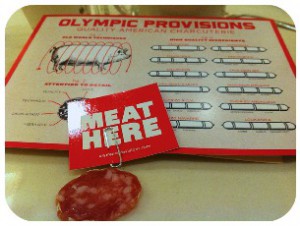 When master salami maker Elias Cairo opened his restaurant Olympic Provisions in 2009, the company’s name seemed to be a gift from fate. Not only did the brand resonate with his Greek heritage, but it also paid tribute to the original resident of his eatery’s building, Olympic Mills. Early success allowed Cairo and his partners to expand the packaged salami-selling side of the business, which eventually grew into a major operation with distribution in 46 states. More restaurant openings and acclaim followed over the years, including a cookbook deal and an advertising partnership with Triscuit. However, the Portland, Oregon-based company’s high-profile also brought attention from an unwelcome source: the International Olympic Committee.
When master salami maker Elias Cairo opened his restaurant Olympic Provisions in 2009, the company’s name seemed to be a gift from fate. Not only did the brand resonate with his Greek heritage, but it also paid tribute to the original resident of his eatery’s building, Olympic Mills. Early success allowed Cairo and his partners to expand the packaged salami-selling side of the business, which eventually grew into a major operation with distribution in 46 states. More restaurant openings and acclaim followed over the years, including a cookbook deal and an advertising partnership with Triscuit. However, the Portland, Oregon-based company’s high-profile also brought attention from an unwelcome source: the International Olympic Committee.
The athletic organization first reached out to Cairo in September 2014 when they sent him a blunt letter demanding that he change his company’s name. While the IOC acknowledged that Olympic Provisions’ marketing did not mention the quadrennial games, they still claimed the salami company was infringing on its iconic brand. “My first instinct was to fight it, because we are obviously not the Olympics, and no one is confused,” Cairo said. “So I reached out to an attorney, and he just starts laughing and tells me, ‘Nobody in history has ever beat this, and they have a whole lot more money than you have.’” Ultimately, the lawyer was right. Although Cairo and his partners fought the IOC until the end of 2014, they eventually accepted defeat and changed the company’s name to Olympia Provisions.
In some ways the IOC is just like any major corporation that fights to protect the prestige of its brand. On the other hand, almost no other organization has their own federal statute on U.S. law books designed expressly for this purpose. According to the Ted Stevens Olympic and Amateur Sports Act, only the IOC and its American counterpart can license the terms “Olympics” and “Olympiad” as well as the famous interlocking rings logo. These trademarks are then used by the U.S. Olympic Committee to raise money for Team USA, which does not receive government funding. Only companies that formed before 1950 or are located near Washington’s Olympic mountain range are exempt from these rules. Meanwhile, businesses like the former Olympic Provisions are left to learn about the power of the IOC the hard way. Cairo said the switch cost the company at least $50,000, not including legal fees or lost business. Nevertheless, Olympia Provisions’ commitment to quality and its dedicated customer base have allowed it continue thriving despite the branding setback.
Questions:
- Is it ethical for the International and U.S. Olympic Committees to keep such tight control over the word “Olympic?”
- Should companies like Olympia Provisions receive compensation from the IOC to offset their rebranding costs?
Source: Kristen Saladow, “The IOC Got Mad at this Artisanal Salami Maker for Using “Olympic” in Their Name,” Quartz, August 17, 2016. Photo by Jen Arrr.
